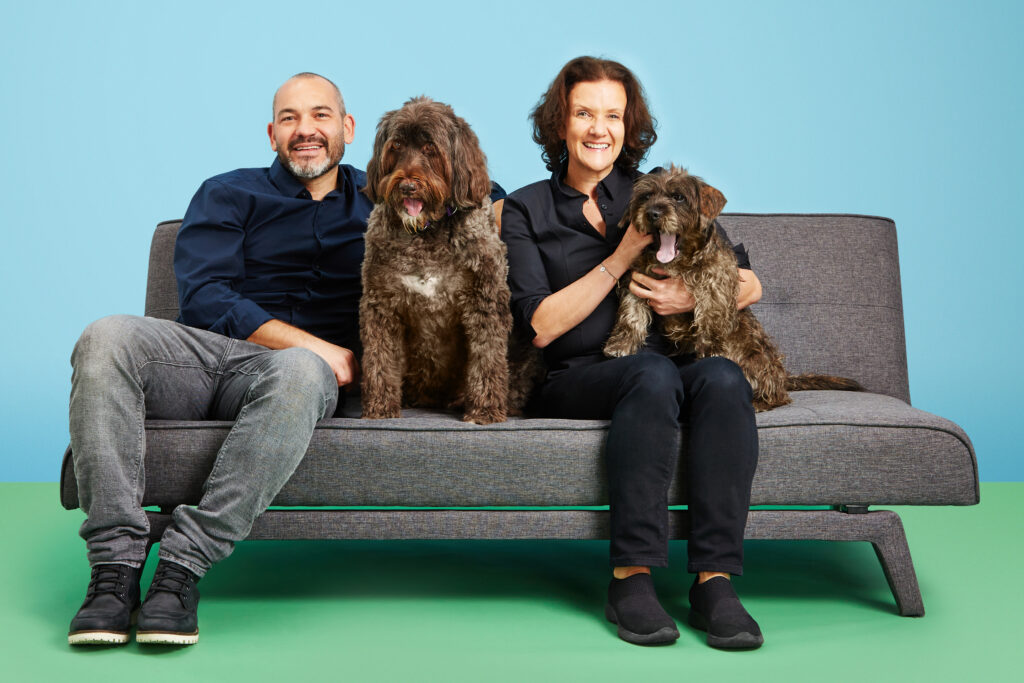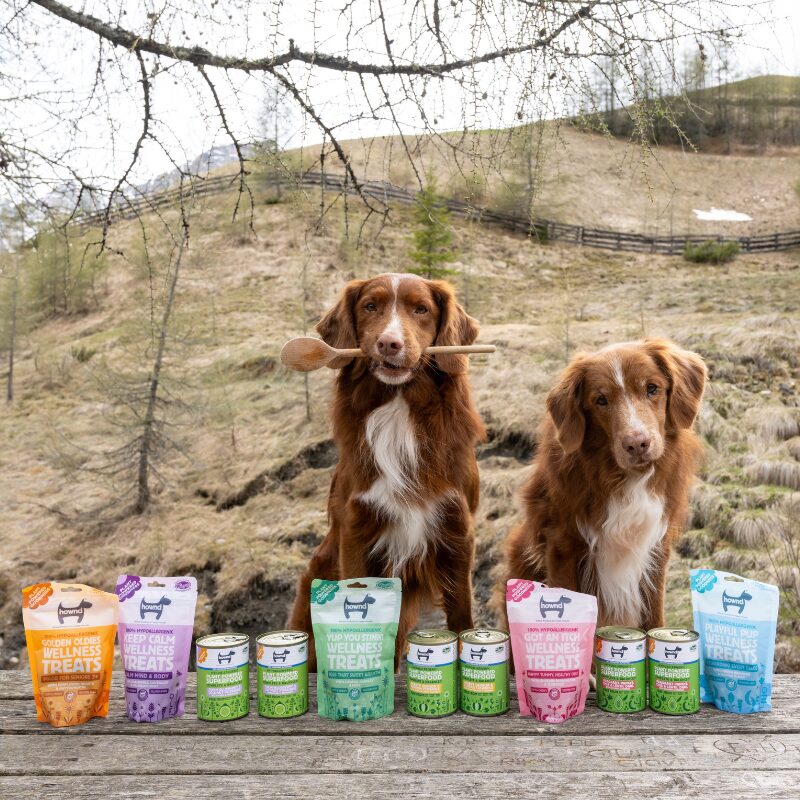Pets Choice to Acquire Vegan Dog Food Brand Hownd, With Founders Exiting the Business
6 Mins Read
UK manufacturer Pets Choice has agreed to acquire vegan dog food maker Hownd for an undisclosed sum, in what is described as a “positive” deal for the brand.
Power Pet Brands, the parent company of Hownd, has agreed to sell the vegan dog food startup to legacy manufacturer Pets Choice.
The deal will see Hownd co-founders Jo Amit and Mark Hirschel exit the business, with Pets Choice taking over operations from August 5.
As a manufacturer of branded and white-label pet food, Pets Choice has an extensive portfolio with brands dating back to 1881, including Davies, Webbox, Bob Martin, Felight, TastyBone and Vet’s Kitchen.
Hirschel, who described the move as a “strategic milestone”, declined to comment when asked about the financials involved, but did confirm that Pets Choice will own 100% of the Hownd brand following the completion of the deal.
Pets Choice CEO Tony Raeburn suggested the acquisition will bolster its drive into product premiumisation, with Hownd helping the company enter the $14B vegan dog food sector. “We look forward to leveraging Hownd’s established market presence and extensive and loyal customer base, further solidifying our position as a leader in the pet care industry,” he said.
Why Hownd was sold to Pets Choice

First established in 2013 as Butch & Bess, Hownd rebranded to its current name two years later, and has become known for its hypoallergenic dog food range – which includes kibble as well as canned porridge, dal and casserole – and wellness treats targeting different functions and ages. It also offers pet care in the form of shampoos, conditioners, skincare and sunscreen.
The startup has built its reputation as an ethical brand, topping the environmental impact, animal welfare, and public record categories in the Good Shopping Guide 2024, which ranks ethical businesses around the world. Its nutritionally complete dog food has also been recognised in Forward Fooding’s FoodTech 500 list of food innovators for two years running.
But these successes have come against a backdrop of faltering sales in the larger plant-based industry, with investors becoming more cautious with their capital in the post-pandemic landscape. In 2023, investment in vegan startups was down by 24% globally, reaching $908M. This year, only $58M was pumped into the sector in the first quarter.
In light of this, Hirschel explained that the decision to sell was influenced both by Hownd’s success as well as the industry’s headwinds. “Market conditions are tough, they have been for a while now. It’s not just plant-based companies – I see struggles across many different industries,” he said.
“But cash is king, as we all know, and it does take deep pockets to launch into the pet food space across multiple distribution channels. Hownd is a well-respected brand brought to the market in 2013 with loads of growth potential, but as business owners, it’s important to know when the future success is best in someone else’s hands, and for us, the time is now.”
Co-founders to leave the startup

Hirschel said the deal would have a positive effect on Hownd’s portfolio and distribution: “The buyers are extremely well-established, managing a portfolio of brands and shipping globally. They will be putting both time and investment into scaling the brand and its distribution channels, and will be able to do this much faster and more efficiently than we would be able to on our own.”
Hownd’s employees will be subject to the UK’s Transfer of Undertakings (Protection of Employment) regulations, which protect workers when they’re transferred to a new employer.
But it does mean that both Hirschel and Amit will leave their roles and the business they founded over a decade ago. “I’d like to think that we will both take on other employment for the time being, as we have a non-compete [clause] built into the sale, with regards to vegan pet food [or pet care],” explained Hirschel.
“Whether that’s together or separately is anyone’s best guess right now, but we’re both well-connected with lots of experience, so let’s just see what happens,” he added. “And who knows what happens a bit further down the road? We both love looking at opportunities and have plenty of ideas up our sleeves.”
Amit said she’s exploring “purely purpose-driven roles”, helping create and launch new brands and products in a new, but related sector. “I’m passionate about all forms of animal welfare and environmental sustainability, including rewilding projects,” she told Green Queen. “These areas resonate deeply with my values, and I am eager to contribute more significantly to these causes.”
‘Not all vegan pet food brands will survive’

The last 12 months have seen M&A deals proliferate in the plant-based space, reflecting a wider trend in the food industry, which saw M&A activity jump by 57% in 2023. Leading examples include VFC’s evolution into the Vegan Food Group – a holding company that now owns Meatless Farm, Clive’s Purely Plants and TofuTown – Ahimsa Companies’ takeover of Wicked Kitchen, Next Level Burger’s purchase of Veggie Grill, and Australia’s All G Foods spinning off Love Buds, which merged with Fenn Foods’ vEEF to form The Aussie Plant-Based Co.
Some have suggested that this is a reflection of the tough macroeconomic conditions and cooling consumer interest in certain products and categories. While Hirschel noted that it’s common to see M&As increase during tough times, he said he doesn’t believe consolidation is crucial.
But he added: “It’s early days with regards to growth in the vegan pet space, and sometimes consolidation can be the driving force between creating a successful brand and a struggling one. There are loads of new players entering the category and we know that not all will survive, so deal-making at the right time can be instrumental to a brand’s success.”
So why are brands finding it hard to survive? For vegan pet food makers, the biggest challenge is consumer adoption, he said: “We’ve had decades of marketing and media telling us that dogs need meat, and this just isn’t true. So it takes time for consumers to trust a different way of thinking and see the benefits of a plant-based diet first-hand.
“Lots and lots of education and marketing are needed, and this can be challenging. There’s also a general belief that plant-based is not enticing enough for dogs – but again, this is just not true, and many dogs are choosing the taste of plant-based over other meat alternatives.
“And finally, there is price… Generally speaking, it’s more expensive to make a premium plant-based recipe than a meat-based one – this is mostly down to government livestock farming subsidies and also [the fact] that production costs are higher at factories, as more prep is required to flush and clean the equipment to avoid cross-contamination.”
So what’s next for Hownd, which has raised over £300,000 ($389,000) in funding? “The new owners will be investing into Hownd [by] adding more breadth and depth to the product assortment and pushing the brand through more distribution channels,” said Hirschel.
“The Hownd brand is already well-loved and respected, so now it’s about driving that competitive edge in the marketplace, increasing exposure and bringing in loads of new customers.”



